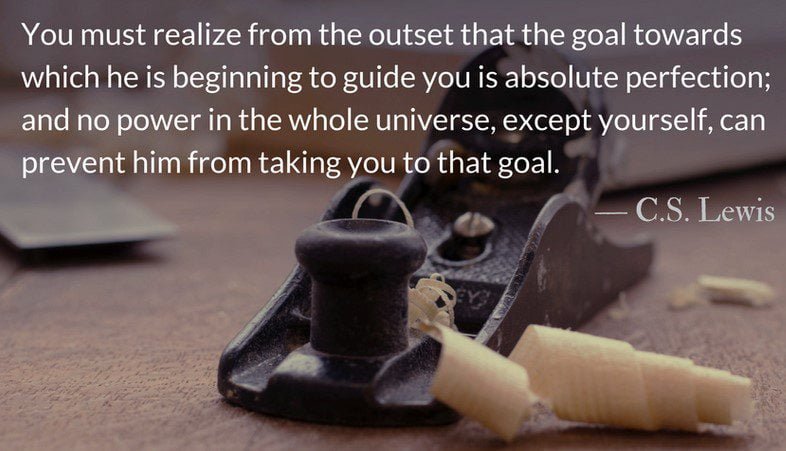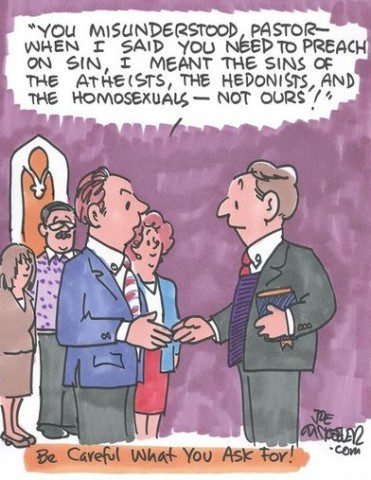
Evangelicals believe that humanity can be neatly divided into two classes: saved or lost; in or out; Christian or not. There’s no ambiguity. Either a person has been born-again (born from above) or he is lost, dead in trespasses and sins (Ephesians 2:1), the enemy of God (James 4:4). Either a person is on God’s side or he is a follower of Satan (John 8:44). Either a person is headed for Heaven or he is bound for Hell. Granted, Evangelicals fight amongst themselves over what exactly is required for someone to be saved, but once the deed is done, new converts enter an exclusive group of humans — the redeemed.
Most Evangelicals believe that once a person is saved, his salvation is forever; that there is nothing that can separate him from the love of God. Romans 8:31-39 says:
What shall we then say to these things? If God be for us, who can be against us? He that spared not his own Son, but delivered him up for us all, how shall he not with him also freely give us all things? Who shall lay any thing to the charge of God’s elect? It is God that justifieth. Who is he that condemneth? It is Christ that died, yea rather, that is risen again, who is even at the right hand of God, who also maketh intercession for us. Who shall separate us from the love of Christ? shall tribulation, or distress, or persecution, or famine, or nakedness, or peril, or sword? As it is written, For thy sake we are killed all the day long; we are accounted as sheep for the slaughter. Nay, in all these things we are more than conquerors through him that loved us. For I am persuaded, that neither death, nor life, nor angels, nor principalities, nor powers, nor things present, nor things to come, Nor height, nor depth, nor any other creature, shall be able to separate us from the love of God, which is in Christ Jesus our Lord.
In John 10: 27-29, Jesus allegedly said:
My sheep hear my voice, and I know them, and they follow me: And I give unto them eternal life; and they shall never perish, neither shall any man pluck them out of my hand. My Father, which gave them me, is greater than all; and no man is able to pluck them out of my Father’s hand.
According to this text, it is Jesus who gives sinners eternal life, and once this is given to them, it can never be taken away. Calvinists and Arminians endlessly bicker with each other over what these verses “really” mean, but both sides agree that Jesus grants salvation and eternal life to all those who “confess with thy mouth the Lord Jesus, and believe in thine heart that God hath raised him from the dead.” (Romans 10)
Once a person is saved, he begins living out an endless cycle of being in and out of the will of God; of being on fire and lukewarm. Evangelical preachers spend countless Sundays encouraging Christians to do the basics: read/study the Bible, pray, attend church, witness to unbelievers, and financially support their local churches. Sometimes, preachers try to guilt congregants into doing these things. Remember what Jesus did for you on the cross of Calvary! Surely, you can do these things for him! It’s the least you can do! Jesus is portrayed as someone who gave his all to save lost sinners, and if he was willing to die on the cross for them, surely his followers can devote themselves to the basics of the Christian faith.
I came of age in the Independent Fundamentalist Baptist (IFB) church movement. Saved, baptized, and called to preach at the age of fifteen, I was a devoted follower of Jesus Christ. I attended church three times on Sundays and once on Wednesdays. I also attended youth group after church on Sunday nights, and participated in extracurricular youth activities during the week. On Tuesdays, I went on church visitation, hoping to either evangelize the lost or encourage Christian deadbeats to get back into church. On Saturday mornings, I went on bus visitation, contacting bus riders to remind them that we would be by to pick them up the next day and canvassing for new riders. Once a month, area IFB churches would get together and hold a youth rally, one of my favorite events due to the larger pool of dateable girls it afforded me. And if this wasn’t enough to keep me busy, the church held a week-long revival meeting several times a year, an annual missions conference, and periodic two- or three-day preaching meetings. One week each summer was devoted to youth camp, a time when church teens were assaulted with Bible preaching morning, noon, and night.
The goal of this immersive religious conditioning and indoctrination was to keep believers on the straight and narrow. As I mentioned above, once a person is saved, he begins living out an endless cycle of being in and out of the will of God; of being on fire and lukewarm. In most Evangelical churches, out-of-the-will-of-God, lukewarm Christians vastly outnumber those who are on fire. Most Evangelical congregants are passive church attendees. The bigger the congregation the more this is so. Pastors will try all sorts of methods, programs, and vaudeville gimmicks to motivate congregants, but they rarely, if ever, result in long-term, lasting change. Revivals, youth rallies, and youth camps were used as tools to stir the emotions of those of us deemed “not right with God.” And these tools worked — for a while.
I attended countless services where I felt Holy Ghost “conviction” over “sin” in my life. Evangelists — who were experts at emotionally manipulating people and extracting outward demonstrations of repentance and contrition — focused on sin, calling all those not right with God to come to the church altar and do business with God. I responded to countless such altar calls during my years in the Evangelical church. I sincerely believed that the Holy Ghost was speaking to me and convicting me of my sins. I’d kneel at the altar, weep and pray, and then arise feeling cleansed from all unrighteousness. (1 John 1:9) These moments were oh-so-special. Why? Because at that moment I felt close to God. I felt that everything was right in my world and between me and my Savior, the Lord Jesus Christ. Alas, much like taking a bath, this feeling didn’t last. Sometimes, I didn’t even make it out of the church building before sinning again. Damn, those girls. 🙂
I tried really, really, really hard to maintain a holy walk before the Lord, but temptations were everywhere. And try as I might to not give into them, eventually I would succumb, requiring me to yet again walk the proverbial sawdust trail, kneel at the altar, and confess my sins. My pastors taught me that Christians and sinners alike sinned in thought, word, and deed. Boy, were they right, or so I thought at the time. In a world where everything matters and sin lists are endless, it shouldn’t be surprising that righteousness and holiness were elusive, if not impossible to find. This environment, of course, drove me to embrace perfectionism. After all, Jesus purportedly said in Matthew 5:48: You therefore must be perfect, as your heavenly Father is perfect. I thought, at the time, that if, as the Bible says, God gives Christians everything we need pertaining to life and godliness (2 Peter 1:3) and the Holy Spirit indwells every believer (1 John 4:12-14 and Ephesians 1:13, 14) and is their ever-present teacher and guide (John 14:26 and 1 John 2:27 and John 16:13), perfectionism should be achievable — or pretty close anyway. And so, day after day, month after month, and year after year, I ran the race set before me (1 Corinthians 9:24 and Hebrews 12:1,2), striving for holiness, without which, the Apostle Paul said, no man shall see the Lord.
Polly and I have spent considerable time talking about how driven we were as Christians to find the faith and way of life we heard preachers preach about, inspirational books talk about, and Christian artists sing about. We wanted Jesus in our lives 24-7, just like these preachers, authors, and musicians supposedly had. Try as we might, we never reached the peak of spiritual Mount Everest. No matter how much effort and energy we put into reaching the summit, we failed. It was not until the tail end of our time as Christians that we realized that we had spent the best years of our lives chasing after the unattainable; that we were, in every way, just like the unwashed, uncircumcised Philistines of the world. Yes, we were Christians; yes, we loved Jesus, but we were also flesh-and-blood human beings. Once we understood this, it was as if a huge weight of guilt was lifted from us. Of course, those who were still chasing righteousness and holiness thought differently of us. We were considered backsliders, out of the will of God; carnal Christians who loved the things of the world more than the things of God. (1 John 2:15)
It was during this period of my life I started blogging — circa 2007. I was drinking deeply from the emergent/liberal Christian/Thomas Merton well. My writing attracted Evangelical and IFB preachers who wanted to set me straight about my new-found “sinful” way of life. One man, a Christian Missionary and Alliance preacher, endlessly hounded me, questioning whether I was even a Christian. This preacher, in his life, was where I once was. Fast forward to today, this man is now divorced, remarried, and no longer in the ministry. This story has been repeated over, and over, and over again by countless preachers, evangelists, and other Christians who thought it their mission in life to correct, condemn, or chastise me. Few of them have been able to keep on the straight and narrow. Oh, they might give the outward appearance of godliness, but they know and I know that their lives are little more than a charade. How do I know this? Experience tells me that endlessly striving for perfection leads to psychological and physical harm; that such motivation harms those you love and care about the most. Even Evangelical Calvinist John Piper, a proponent of Christian hedonism, found he couldn’t practice what he preached, leaving the pastorate due to marital “problems.”
If atheism has done anything for me, it has freed me from the endless pursuit of righteousness, holiness, and perfection. Abandoning the Bible and Christianity as my authoritative standard for morality has allowed me greatly reduce the number of behaviors I consider “sins.” As a Christian, my sin list was pages and pages long. Today, my sin list messily fits on a 3×5 index card and is getting smaller by the day. So many of the “sins” I spent countless hours weeping and wailing over, were, in fact, normal, healthy human behaviors.
Much of the preaching I heard focused on sexual sins. Preachers reminded me and I later reminded congregants that Jesus said in Matthew 5:28: But I say to you that everyone who looks at a woman with lustful intent has already committed adultery with her in his heart. Imagine how freeing it was to learn that sexual want, need, and desire were normal and that considering a woman who is not your wife as sexually desirable was not necessarily wrong. I learned the same about anger. I spent most of my life holding in my anger, only to have angry outbursts towards Polly and our children when no one but they could see me. As a Christian and a pastor, I was never allowed to be angry. Of course, this only led to me living a double-faced life: “always-in-control Pastor Bruce” while in public, and “angry out-of-control Pastor Bruce” when behind closed doors. Imagine how refreshing it was to learn through counseling that anger is a normal, healthy human emotion and that the important thing is what I do with my anger. I have learned over the past fifteen years that most of the behaviors called “sin” in my Evangelical past were, in fact, anything but. And that instead of constantly striving for perfection, it was okay to just be Bruce Gerencser. Now, this doesn’t mean I never act inappropriately. I do. I am, after all, human. If you doubt this, just ask Polly. 🙂 She will set you straight on the matter. When I find that I have harmed someone else with my words or deeds, I try, if possible, to make restitution. My goal as a humanist is to be a good person, to love and respect others, and treat them with kindness. Simply put, I strive every day to not be an asshole.
How has your life changed post-Christianity? Please share your story in the comment section. I would love to especially hear from former fellow perfectionists.
Bruce Gerencser, 68, lives in rural Northwest Ohio with his wife of 47 years. He and his wife have six grown children and sixteen grandchildren. Bruce pastored Evangelical churches for twenty-five years in Ohio, Texas, and Michigan. Bruce left the ministry in 2005, and in 2008 he left Christianity. Bruce is now a humanist and an atheist.
Your comments are welcome and appreciated. All first-time comments are moderated. Please read the commenting rules before commenting.
You can email Bruce via the Contact Form.















